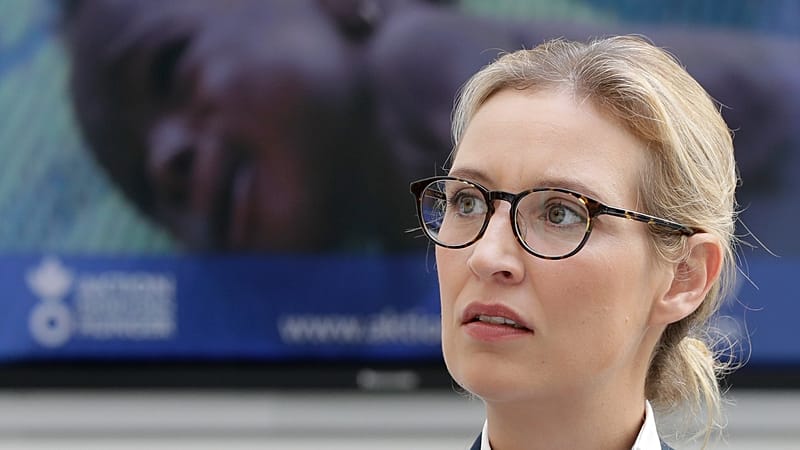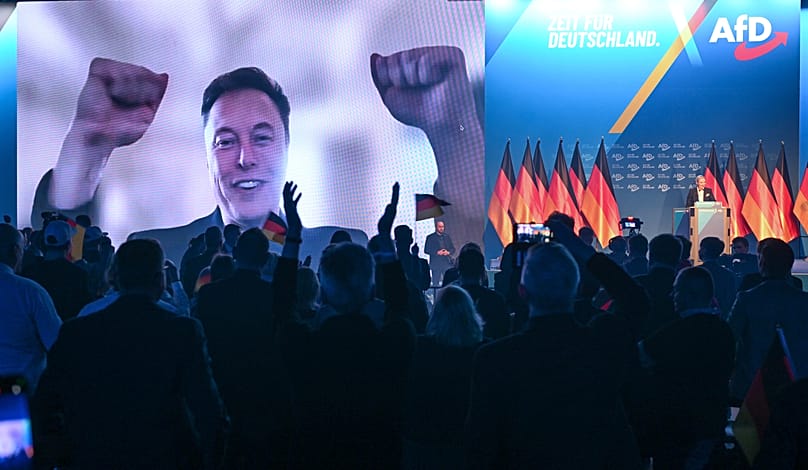Did Trump invite the AfD's Alice Weidel to the White House? Not exactly

A series of posts, videos and photos relayed across X and Facebook have misleadingly purported that US President Donald Trump has extended a personal White House invitation to Alice Weidel, the co-leader of the far-right Alternative for Germany (AfD).
"Donald Trump has officially invited Weidel and the AfD to Washington”, stated one X user, in a post which has been viewed more than 90,000 times.
Other pro-AfD accounts have also relayed the claim, with one German YouTuber alleging that Weidel was planning a flight to Washington "to meet Trump" in a clip which has garnered more than 64,000 views.
So was Weidel invited to the White House? Not exactly.
On 26 October, Republican US Representative Anna Paulina Luna extended an invitation to meet with Weidel in an X post.
"Please consider coming with a delegation of your members from AfD to Washington DC," she said. "I would like to host you with a few other members of Congress."
The following day, Weidel provided a response, stating she would contact Luna to discuss how to "make it happen".
On 29 October, Luna posted that she had met with Anna Rathert, an AfD politician in the Bundestag, adding that she would be hosting the AfD for a meeting in December.
A spokesperson for Luna told Euronews' verification team, The Cube, that the Congresswoman was open to meeting Weidel and that she would host an AfD delegation in December.
The AfD and the White House have so far not responded to our requests for comment.
Is Trump involved?
So, what's the difference between an invitation from a member of Congress and an official summons from the White House?
According to USAGov — the official website for government information and services — meetings initiated by individual members of Congress are considered partisan outreach rather than official diplomacy.
Only the executive branch of the US government, which includes the White House and Trump, has the authority to conduct government-level engagement with foreign political actors.
Such official visits are coordinated through the US State Department and typically generate press readouts or are logged in official visitor logs. In contrast, an invitation issued by an individual US lawmaker, such as Luna, does not require involvement from the executive branch and therefore signals no immediate White House involvement.
Members of Congress may support or challenge foreign policy, according to the Congressional Research Service, but can't themselves carry out official diplomacy.
For the AfD, Luna's invitation is a signal that the party has allies in the US political system, but it doesn't amount to an official stance from the US government.
The MAGA movement and the AfD
Despite not receiving an invitation from Trump himself, the AfD has been working to bolster its relationship with the US administration.
In September, the AfD's deputy leader Beatrich von Storch stated that she had visited the White House to hold strategic talks with "US representatives from the Domestic Policy Council, the Vice President's Office, the National Security Council, and the State Department", in a post shared on X.
In an interview with Swiss radio Kontrafunk, she said the talks focused primarily on freedom of expression and that the US representatives present were interested in "restrictions on freedom of speech and censorship in Germany". The White House provided no public acknowledgement of the meeting.
The AfD's co-leader, Tino Chrupalla, alongside a handful of AfD members and the conservative Christian Democratic Union’s foreign policy expert Jürgen Hardt, also attended Trump's inauguration in January.
Shortly after, US Secretary of State Marco Rubio accused Berlin of "tyranny in disguise" after Germany's domestic intelligence agency classified the party as a "proven right-wing extremist organisation" — a classification that has been put on hold as the AfD challenges it in court.
The budding alliance between the MAGA movement and the AfD first made headlines after tech billionaire and former close Trump ally Elon Musk repeatedly came out in support of the party in the run-up to Germany's general election in February.
Musk endorsed the party in a controversial op-ed, held a recorded call with Weidel, and dialled in to an AfD rally in Halle, where he said the party were the "best hope" for Germany's future.
The AfD and the Trump administration, according to von Storch, align on being "against islamisation, against migration, against woke culture".
Prior to their rapprochement, the AfD portrayed US foreign policy as a threat to Germany's sovereignty during Biden's Presidency. They have also long called for the withdrawal of US troops from Germany, while questioning the NATO military alliance.
Today


